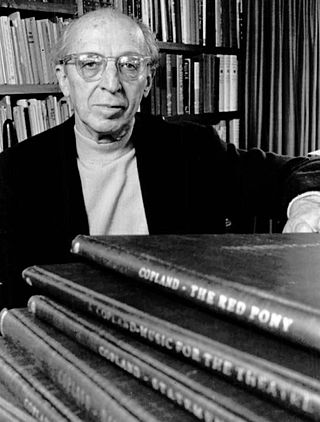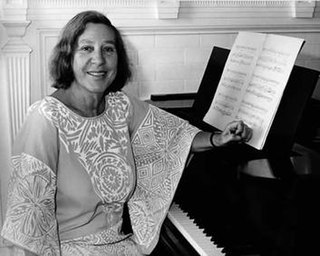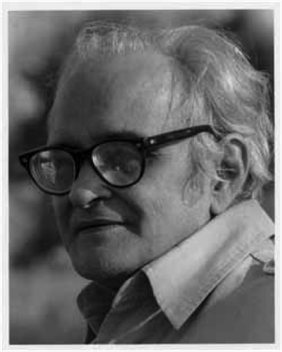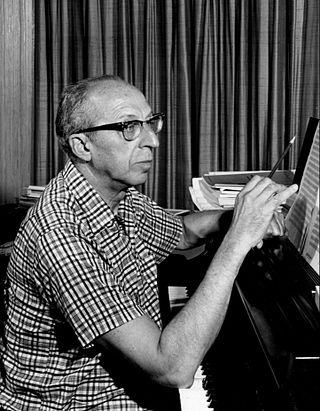
Aaron Copland was an American composer, critic, writer, teacher, pianist and later a conductor of his own and other American music. Copland was referred to by his peers and critics as the "Dean of American Composers". The open, slowly changing harmonies in much of his music are typical of what many people consider to be the sound of American music, evoking the vast American landscape and pioneer spirit. He is best known for the works he wrote in the 1930s and 1940s in a deliberately accessible style often referred to as "populist" and which the composer labeled his "vernacular" style. Works in this vein include the ballets Appalachian Spring, Billy the Kid and Rodeo, his Fanfare for the Common Man and Third Symphony. In addition to his ballets and orchestral works, he produced music in many other genres, including chamber music, vocal works, opera and film scores.
Harold Samuel Shapero was an American composer.

David Conte is an American composer who has written over 150 works published by E.C. Schirmer, including six operas, a musical, works for chorus, solo voice, orchestra, chamber music, organ, piano, guitar, and harp. Conte has received commissions from Chanticleer, the San Francisco Symphony Chorus, Harvard University Chorus, the Men’s Glee Clubs of Cornell University and the University of Notre Dame, GALA Choruses from the cities of San Francisco, New York, Boston, Atlanta, Seattle, and Washington, D.C., the Dayton Philharmonic, the Oakland Symphony, the Stockton Symphony, the Atlantic Classical Orchestra, the American Guild of Organists, Sonoma City Opera, and the Gerbode Foundation. He was honored with the American Choral Directors Association (ACDA) Brock Commission in 2007 for his work The Nine Muses, and in 2016 he won the National Association of Teachers of Singing (NATS) Art Song Composition Award for his work American Death Ballads.

Rubin Goldmark was an American composer, pianist, and educator. Although in his time he was an often-performed American nationalist composer, his works are seldom played now. Today he is best known as the teacher of other important composers, including Aaron Copland and George Gershwin.

Connotations is a classical music composition for symphony orchestra written by American composer Aaron Copland. Commissioned by Leonard Bernstein in 1962 to commemorate the opening of Philharmonic Hall in New York City, United States, this piece marks a departure from Copland's populist period, which began with El Salón México in 1936 and includes the works he is most famous for such as Appalachian Spring, Lincoln Portrait and Rodeo. It represents a return to a more dissonant style of composition in which Copland wrote from the end of his studies with French pedagogue Nadia Boulanger and return from Europe in 1924 until the Great Depression. It was also Copland's first dodecaphonic work for orchestra, a style he had disparaged until he heard the music of French composer Pierre Boulez and adapted the method for himself in his Piano Quartet of 1950. While the composer had produced other orchestral works contemporary to Connotations, it was his first purely symphonic work since his Third Symphony, written in 1947.
Jerome Moross was an American composer best known for his music for film and television. He also composed works for symphony orchestras, chamber ensembles, soloists and musical theater, as well as orchestrating scores for other composers.

William Quincy Porter was an American composer and teacher of classical music.

Vivian Fine was an American composer.

Julián Orbónde Soto (August 7, 1925, Avilés, Spain – May 21, 1991, Miami, Florida was a Cuban composer who lived and composed in Spain, Cuba, Mexico, and the United States of America. Aaron Copland referred to Orbón as "Cuba's most gifted composer of the new generation."
Aaron Copland's Clarinet Concerto was written between 1947 and 1949, although a first version was available in 1948. The concerto was later choreographed by Jerome Robbins for the ballet Pied Piper (1951).
The Piano Variations of American composer Aaron Copland were written for piano solo from January to October 1930. They were dedicated to American writer and literary critic Gerald Sykes, and were originally published in 1932 by Cos Cob Press, which merged with Arrow Music Press in 1938 and was taken over by Boosey & Hawkes in 1956. The approximate performance time is 11 minutes.
The American Composers Alliance (ACA) is an American nonprofit composer service organization dedicated to the publishing and promoting of American contemporary classical music. Founded in 1937 by Aaron Copland, Milton Adolphus, Marion Bauer and others, it is the oldest national organization of its kind, and represents over 200 member composers.
Ken Ueno is an American composer.

The Aaron Copland House, also known as Rock Hill or Copland House, is the former home of composer Aaron Copland for the last 30 years of his life, and now also a creative center for American music. Located on Washington Street in Cortlandt Manor, New York, United States, and built in the 1940s, the house and its garage were listed on the National Register of Historic Places in 2003, and five years later, in 2008, they were designated a National Historic Landmark, the only one in the country connected to a figure from the world of classical music. The grounds below Copland's home consist of a two-tiered garden ringed by natural woods, and in 2009, the National Wildlife Federation designated the property a Certified Wildlife Habitat.

John Kirkpatrick was an American classical pianist and music scholar, best known for championing the works of Charles Ives, Aaron Copland, Carl Ruggles, and Roy Harris. He gave the first complete public performance of Ives's Concord Sonata in 1939, which became a turning point in the composer's public recognition. Kirkpatrick played an important role in Ives scholarship, and he was leader in the Charles Ives Society. One important example is his role in the editing of Memos, which is a collection of Ives's autobiographical writings. At the time of his death Kirkpatrick was a professor emeritus at Yale University, where he had also been the curator of the Charles Ives archives.
Aaron Copland wrote the Symphony for Organ and Orchestra in 1924. It represents a major work in the composer's oeuvre, as it was his first fully realized orchestral work, his first work for organ, and the first piece whose orchestration he heard. It was premiered on January 11, 1925, in New York. In 1928, Copland re-orchestrated the work without organ as his Symphony No. 1, rewriting the organ part in the brass and adding saxophone.
Michael Miller Horvit is an American composer. Horvit trained at Yale University and Boston University and studied with Aaron Copland, Lukas Foss and Walter Piston, as well as Quincy Porter and Gardner Read. He was a professor of music theory and composition on the faculty of the Moores School of Music at the University of Houston.
Dance Panels is a ballet composed by Aaron Copland in 1959 for a planned collaboration with choreographer Jerome Robbins. After Copland had written the score, Robbins reneged on his commitment and the performance did not take place. Three years later, Copland revised the score for a ballet by the Bavarian State Opera in Munich, Germany, where it premiered on 3 December 1963. The ballet was performed by the New York City Ballet in 1965 and the concert version received its first performance at the Ojai Music Festival the following year. According to Copland biographer Howard Pollack, Dance Panels has proven from a musical standpoint one of the composer's more accessible late scores. While some of its more dissonant moments sound similar to Copland's twelve-tone compositions, other parts recall his earlier stage and screen music. It is also the only one of Copland's six ballets not written to a specific program.

Danzón cubano is a composition for two pianos by American composer Aaron Copland. The piece, written in 1942, was inspired by the Cuban genre of the same name. It was first arranged for orchestra in 1946.
The Short Symphony, or Symphony No. 2, is a symphony written by the American composer Aaron Copland from 1931 to 1933. The name derives from the symphony's short length of only 15 minutes. The work is dedicated to Copland's friend, the Mexican composer and conductor Carlos Chávez. The symphony's first movement is in sonata-allegro form, and its slow second movement follows an adapted ternary form. The third movement resembles the sonata-allegro but has indications of cyclic form. The composition contains complex rhythms and polyharmonies, and it incorporates the composer's emerging interest in serialism as well as influences from Mexican music and German cinema. The symphony includes scoring for a heckelphone and a piano while omitting trombones and a percussion section. Copland later arranged the symphony as a sextet.








